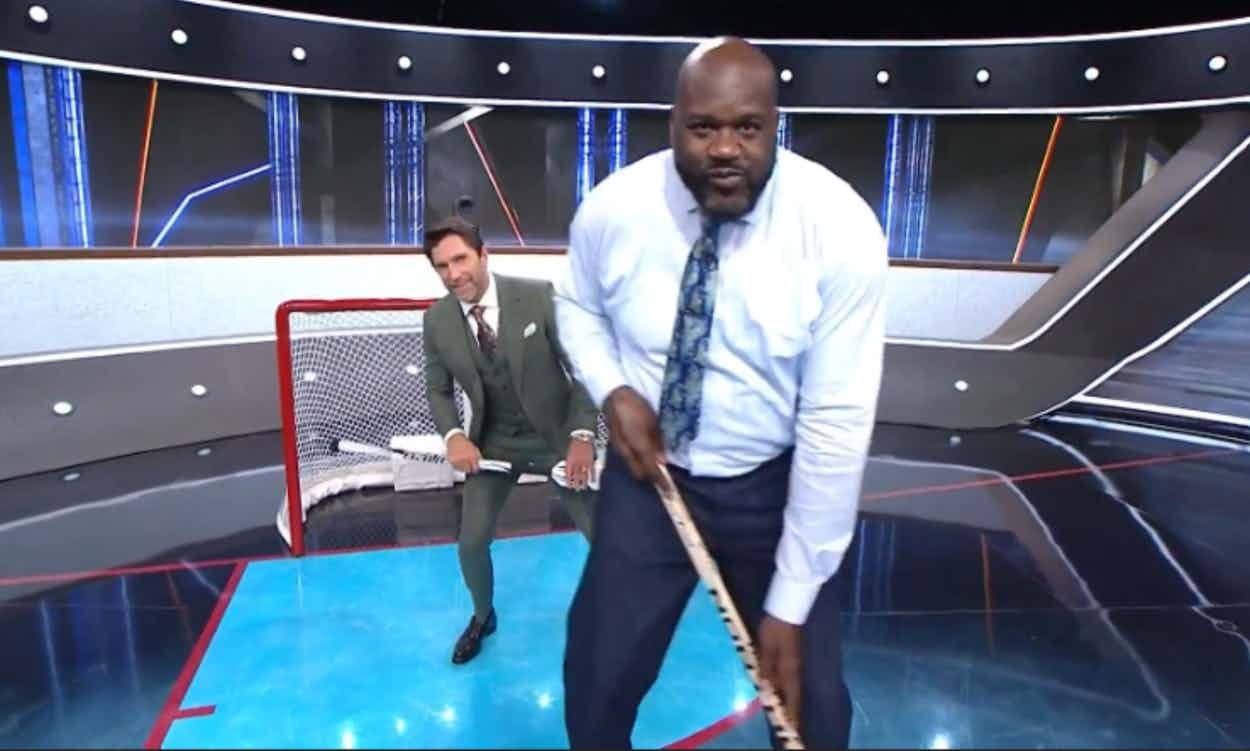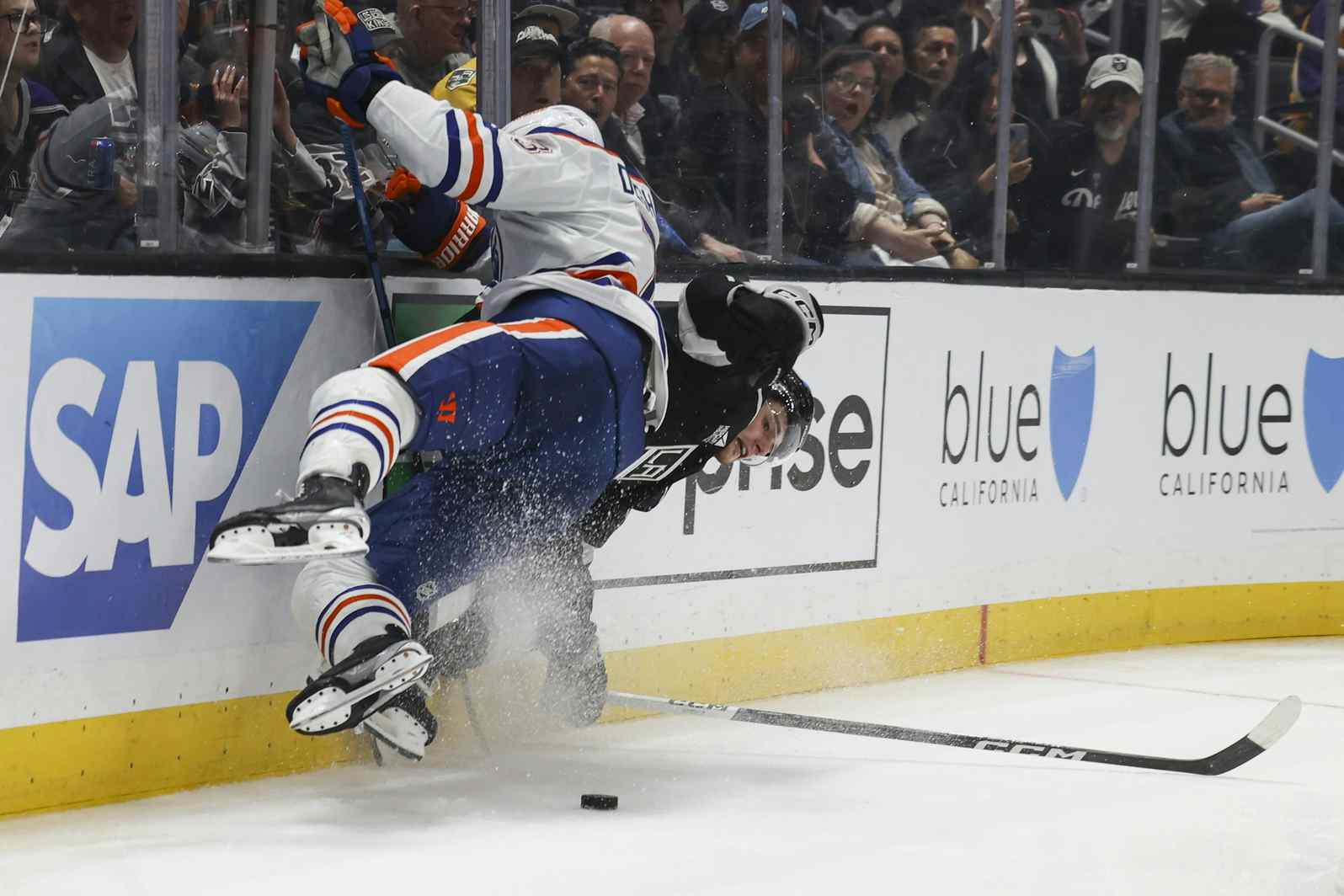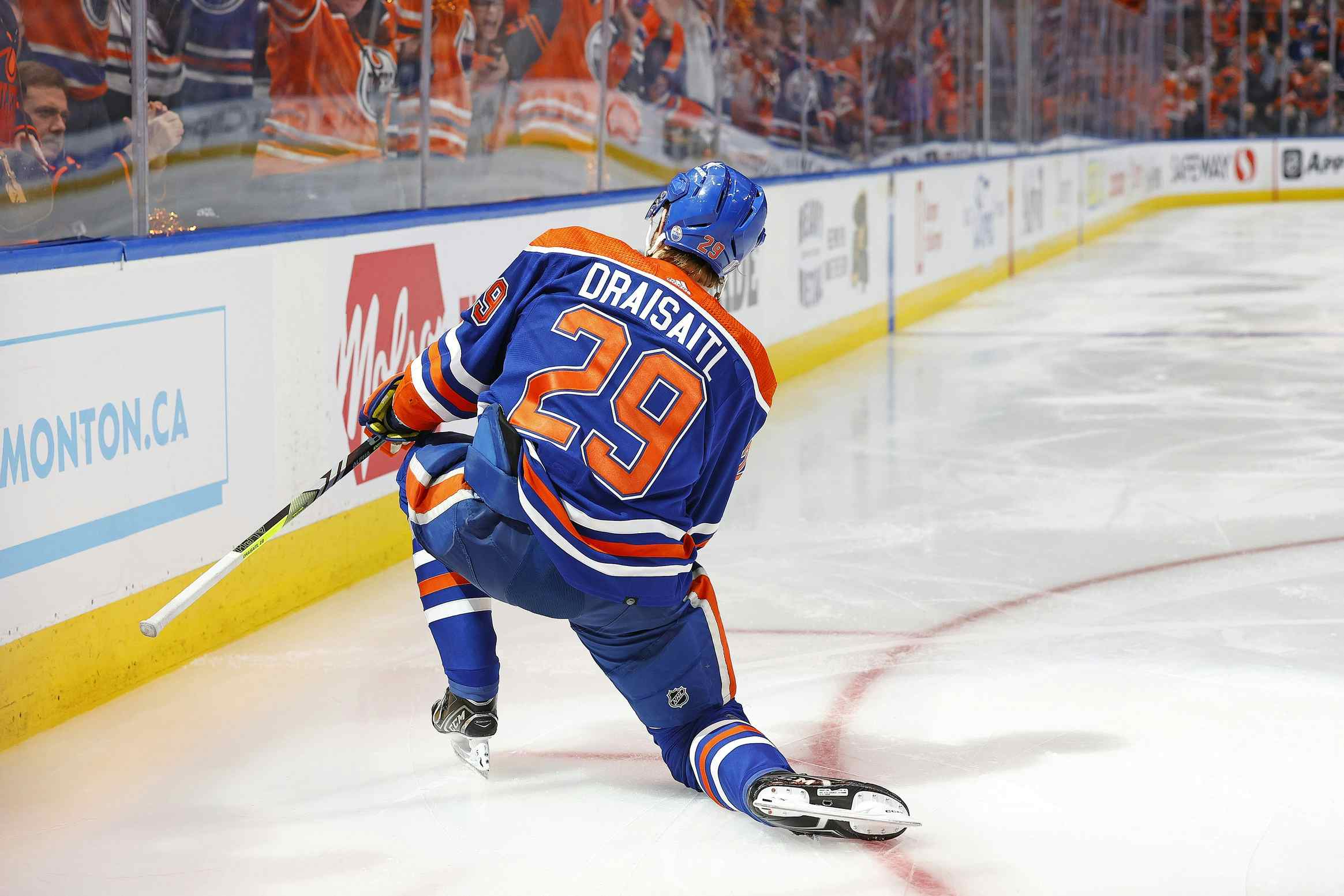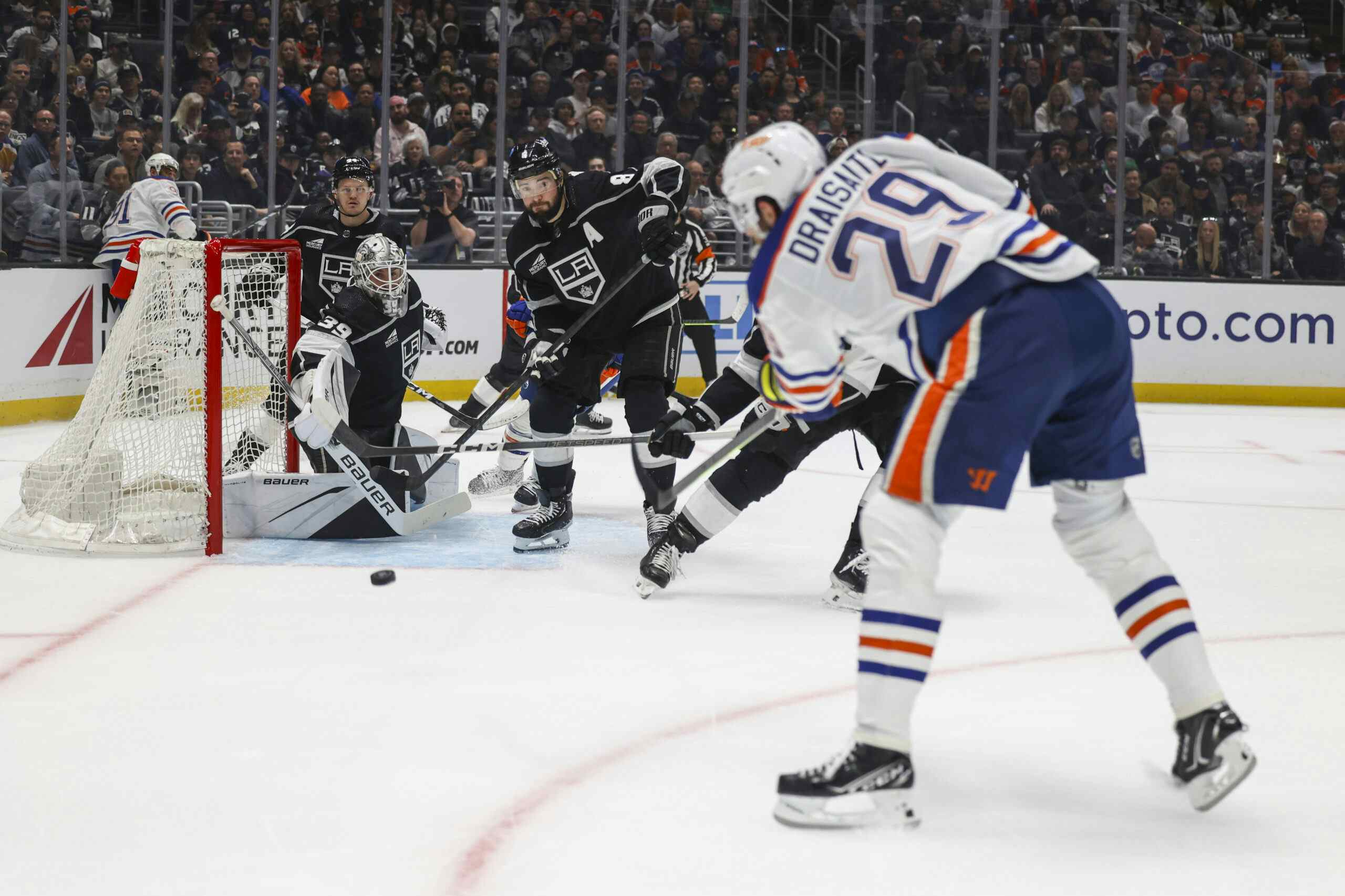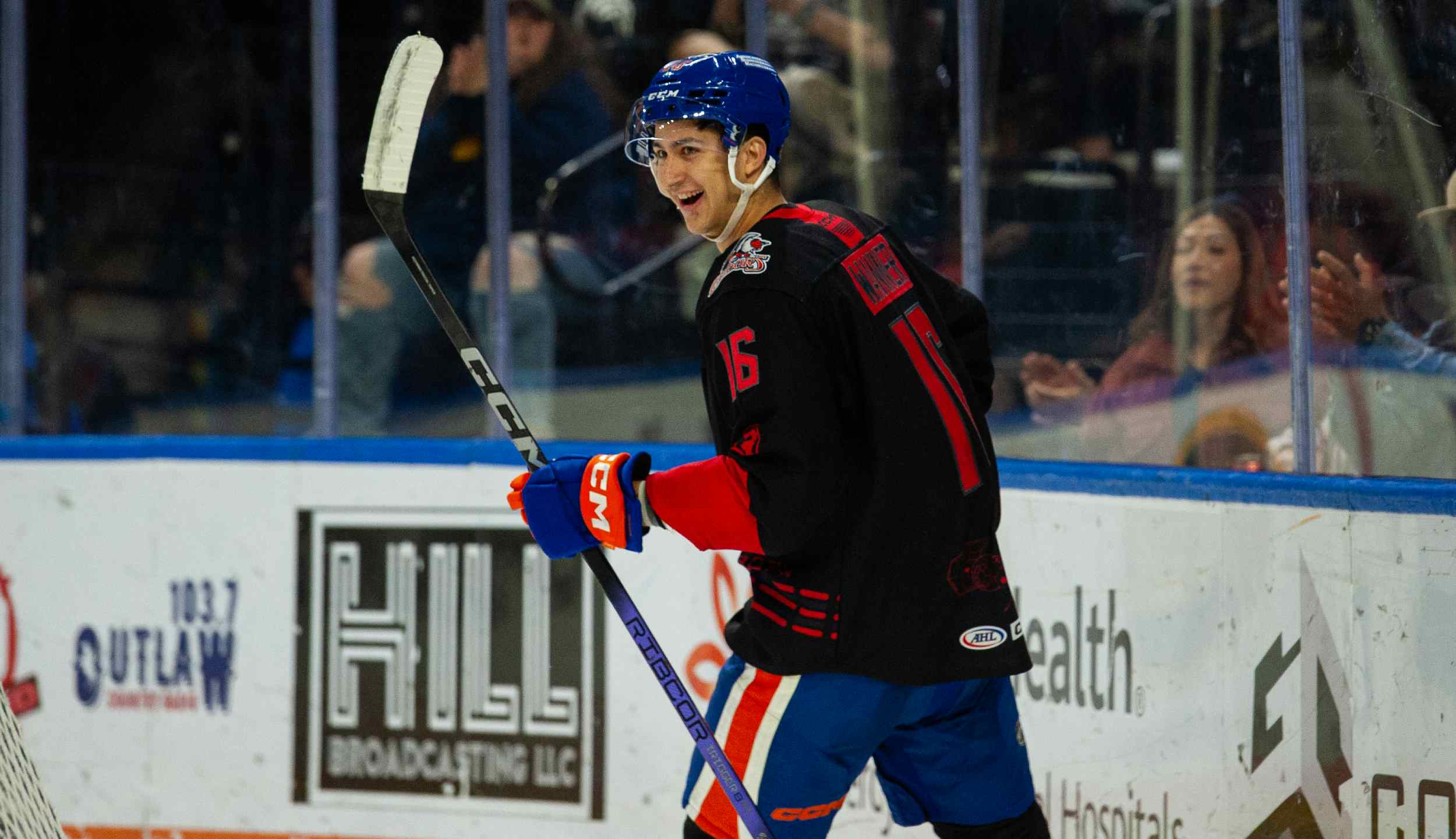Yawney talks PK and Developing the D
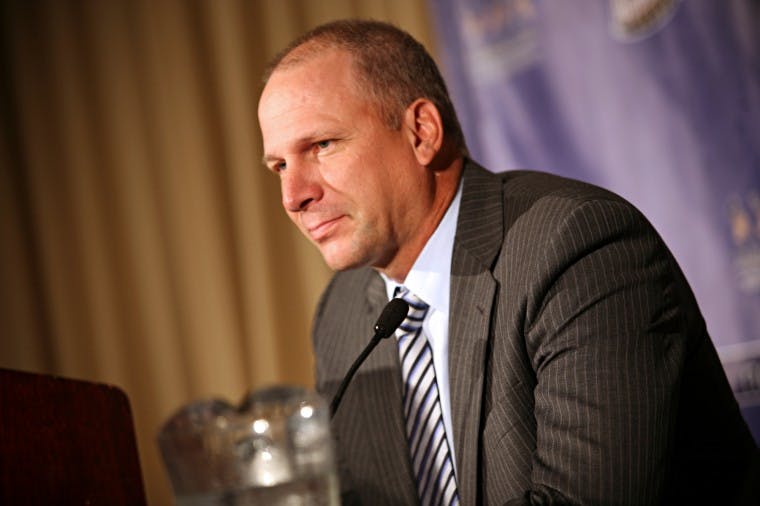
By Jason Gregor
5 years agoTrent Yawney played 593 NHL games with Chicago, Calgary and St.Louis. He retired in 1999 and was an assistant coach the next season with the Blackhawks, and became the head coach of their AHL affiliate in Norfolk the next year. He has been an AHL head coach for eight years, and NHL head coach for one and a half, and he’s been an NHL assistant coach for seven seasons, spending the last four with the Anaheim Ducks.
He has helped develop many young D-men in the Blackhawks and Ducks organizations, and the Oilers are hoping he can help Oscar Klefbom, Adam Larsson, Darnell Nurse, Matt Benning, Ethan Bear, Caleb Jones and the other young D-men in the organization reach their full potential.
He will also oversee the Oilers penalty kill, which over the past four seasons combined is 27th in the NHL. In the same four year span with Yawney running the Ducks’ PK, they were ranked #1. Yawney’s resume is impressive and he should inject a new voice and new excitement on the penalty kill and with the defenceman.
Yawney joined Jason Strudwick and me on my radio show recently to discuss his philosophy on coaching, the penalty kill and developing young defenders.
*My thoughts are in italics***
Jason Strudwick: I remember our time together there in Chicago well. The one thing that always came up with Norfolk was the relationships with players you built there. You were just starting out as a coach, but it seems that belief is something that still continues today. Why is building a relationship with your players so important for you?
Trent Yawney: I think it is huge Struddy. I think the only way you can develop trust with any type of player is by developing a relationship and those two things come first. It’s not just a relationship of the hockey part, it’s getting to know them as people. I mean you coach people, you don’t coach hockey and you’ve got to get to know the person first, and he’s got to get to know you as well because I think that that is equally important.
Strudwick: You talk about that relationship outside of hockey, what exactly do you mean?
Yawney: Well I think it’s important from the standpoint that I’m a big believer that when your players are playing well, you stand behind them. And when things kind of get off of the rails, you jump in front of them, either to protect them and help them in different ways. It might be through video, trying to show them where maybe their game is trending the wrong way. But it also might just be in the coach’s room where you stand up for them and they feel that protection from the coach and that somebody has got their back.
Jason Gregor: You have a reputation of working well with young defensemen and specifically the last few years in Anaheim, and with different types of defensemen. You had an overall skilled, smooth defender in [Hampus] Lindholm, a real rugged guy like [Josh] Manson who I think surprised some people with how good he can be five-on-five and others. I look at Manson and see similarities in style, attitude and skating ability with Darnell Nurse. You’ve coached against Nurse for the last few years; do you see similarities in their game?
Yawney: Oh definitely. I mean I think Nurse has all of the tools to become a top defender in the league and obviously he can eat up a lot of minutes. The guys you mentioned were no different. I mean, I said to them here after I was let go, ‘I wish I had kept video from my days in the American League with them and to show them the before and after.’ Because they deserve a lot of the credit for their development and where they are. But it wasn’t just trying to cast a magic wand over them and they became theses players. They worked hard at it and they worked hard at their positioning and just the detailed part of the game.
Struddy, you know as a defensemen it’s not always the sexy, it’s about the little things that keep you consistent and they keep you in the game. Those are the kinds of things we banged around at — play around your net, your retrieval is getting back to pucks quick, understanding danger when it’s the time to get the puck just outside of the blue line, but when it’s time to hang onto a puck.
So those guys were obviously a pretty good talent pool to work with, and I see the same thing in Edmonton with Nurse and [Adam] Larsson and Klefbom and Matty Benning, whose dad (Brian) I played with. And then you add [Kris] Russell and [Andrej] Sekera, veteran guys, and you need those guys too, because they can keep things on an even keel and are very good players as well.
*I believe Nurse and Benning still have room to grow. Nurse told me his main focus this summer will be working on making more plays in the offensive zone. When you watch the growth in Manson’s game, I believe Nurse can do the same. Benning wasn’t a favourite of Jim Johnson, for whatever reason, and I think he could benefit the most from Yawney. Benning is the best D-man on the team walking the blueline and getting shots through. If Yawney can help these two defensively, and help enhance their confidence in their own zone, I believe the benefits will lead to more offense from both of them.*
Strudwick: You talked about the smaller details of the game. It is sometimes easy when you’re watching a game to see it coming, to say, ‘Oh I’m not sure this guy is in the right position.’ As the coach have you been able to get the players to understand those details? Is it video, is it on ice, is it on the bench, but to you has worked well for the bulk of your guys?
Yawney: Well I’ll use an example that we had here (Anaheim) with a dynamic player, Brandon Montour, and he was ripping up the American League. He came up a year ago, played in the playoffs against Nashville, played very well. He was always on go, and I said to him, ‘just do what we talked about earlier.’
Developing a relationship with the player is crucial because he really didn’t know me that well and I didn’t know him and we needed to build up some trust. I said, ‘Monty, in the word defenseman is the word defense. I’m not going to coach the offense out of you, but if you work with me a little bit on this, because you’re going to need this, you will succeed. Offense comes and goes for a defenseman in the league, especially in the NHL, but you’re always going to have to defend and get better at using your stick, taking away time and space quickly because of your gift which is your quickness.’
I said, ‘In lieu of that, because you didn’t kill a lot of penalties in San Diego, I’m going to put you on the penalty kill.’ Then I added ‘I’m going to be okay with mistakes if you’re committing on a play and they happen to score, you’re not going to have to worry about that. We’ll fix that.’
He bought into that and when I looked at the stuff at the end of the year, after there had been enough time to accurately evaluate, he’d come a long way. He’s come a long way and a lot of my foundation clips, and especially on the penalty kill he’s involved in them. It’s little things like that, it’s the communication, it’s the showing of the video. And I’m not saying saturating them, a lot times it’s positive stuff and maybe just a little tweak here with something negative just to keep them on track and keep them on the rails. Mainly it is making sure they understand that those parts of the game are very, very important.
*A great example of how a coach works with a young player. You challenge them, in this case putting Montour on the PK, but also it gives the player confidence the coach believes in them by giving them an opportunity. I wonder if Yawney, in conjunction with the other two assistant coaches and McLellan consider using this approach with Benning on the powerplay. He hasn’t played there much the past two seasons, but in limited minutes his production is good.*

Gregor: Todd MacLellan said earlier this week that in the morning on game days your main focus will be on penalty kill. It’s not just going to be one guy, it will be by group, but you will oversee it and obviously that’s something you’ve had a lot of success with.
When you talk about the foundation of penalty kills, you’ve had a lot of very good success on different levels with different teams. Many believe it starts in goal, and that’s true to a point, but last season the Oilers gave up way too many cross-seam passes and that killed them early on. When you work on the penalty kill do you work specifically with the defensemen, and then with the forward groups, or do you focus right away on the four being in unison?
Yawney: Well the first part I would say, and I know how Todd works and Gully (Glen Gulutzan) had good penalty killing in Vancouver, there can’t be any grey. On the penalty kill, everybody has a role. There is a systematic process and every team is different, but you have to have that foundation in place. But if a certain play is made from a cross seam for a goal there is probably a reason that happened and that’s usually someone has been caught out of position, so that has to be addressed. There can’t be any grey, but there is another key piece.
The other thing is the pride factor. That comes from the players. The one thing that we had here in the [Andrew] Coglianos, the [Ryan] Getzlaf, [Ryan] Kesler, in Anaheim, [Cam] Fowler and the D they took a lot of pride in the penalty kill, and my years here we had a lot of practice at it, because we were one of the most penalized teams in the league. They took a lot of pride in it, and Getzy (Getzlaf) in particular, when he wasn’t on the penalty kill, he was a little pissy about it because he wanted to be on the penalty kill because he felt it rounded out his five on five game, as far as being in the right spot defensively and all of those kinds of things.
If you start cheating on the penalty kill you’re pulling it out of the back of your net unless your goalie makes a ten bell save, and obviously the goalie is an important guy.
The last thing that I would say that probably goes along with the pride thing is faceoffs. I mean faceoffs on the penalty kill are crucial. If you can win that initial draw and get the puck two hundred feet you start setting the power play up, in terms of making them come to you, so now you’re working with your pressure points versus them thinking that they’re starting with the puck in your zone and that’s where I find the good ones can wear you down and then it’s just a matter of time before they score.
*I think it is fair to suggest the pride wasn’t there from the players in the first half of the season. Of course, the L-shaped PK system didn’t work, but later in the year players like Ryan Strome and Jujhar Khaira really seemed to gravitate towards the challenge of being a solid penalty killer. They also have more PK experience this year, so that combined with Yawney’s system/coaching, the PK should improve. I know that isn’t saying much considering it was the worst home PK in NHL history last year, but overall I doubt we see as many easy goals from the opposition.*
Strudwick: What about the dynamic with the coaching staff, there are some guys that you have familiarity with, what is the process between now and the season?
Yawney: Having worked with Todd before, I know he is very thorough and it’s not going to be like a spontaneous thing. We’ll get together here soon and start chipping away at where we want to go with the group. I mean for us newbies we need to learn the group. We’ve seen them from afar, but getting to know them on a personal basis is very, very important. And then Todd is very good at getting everybody’s feedback in terms of how people, for example the three of us are from the outside of the organization, how we see the team playing and what is their identity, and how we see the game and the trends in the game that we’ve watched and we’ve witnessed with Vegas and obviously Washington playing in the Finals. He’s very, very good at that and you just start putting a plan together and as it draws closer to training camp we ask players to execute the plan, we as coaches have to execute the plan that we put in place for them.
Gregor: In the last four years the Ducks had the best penalty kill in the NHL combined over four years, over eighty-four percent, the only team in the league to be above 84%. You were almost a full percentage point higher than the second place Boston Bruins and the St Louis Blues. Do you find that helps in knowing how to shut down a power play? And will it help you give insight on how to make a power play successful?
Yawney: I think so. I think when you look at our staff that there are all different strengths. And when you look at it from a penalty killing standpoint you tend to see, even though you don’t do the power play, but you have a say in the power play, you can say something along the lines of, ‘this is what gives us a lot of trouble on the PK.’ So then you can maybe add that little tweak into your power play structure and vice versa.
I think when you have a collection of people throwing stuff around that’s how it can make your special teams that much stronger. I mean you look at the top power plays today, Washington and Tampa, the most recent, when the hands lineup I call it, when you have Nicklas Backstrom delivering pucks to one timers in the slot at the top and through the seam, your penalty kill better be on its toes, it better be making good reads and they better have good sticks because once those pucks get through, those shooters will score. The goalie isn’t getting across once it goes through that seam as everyone has witnessed. It’s usually in the back of your net.
So those are the ones that I’m a big believer in. Those are the most difficult ones from the PK side, when you have people that the hands line up.
A couple of years ago we played Edmonton in the playoffs. They shredded us on the power play and it was a little bit different look with the power play with Connor [McDavid] and [Leon] Draisaitl, but they had [Mark] Letestu on the backside and the shot from the top and it gave us some trouble. It works both ways and definitely as I said when those hands line up with the guy from the half wall delivering some one-timers, it can make it difficult on the PK, not necessarily that is un-defendable, but you’ve got to be on point, you’ve got to know what your role is wherever the puck is.
Gregor: The relationship you talked about with Montour and you look at [Darnell] Nurse and [Oscar] Klefbom and others and you want to get to know those guys. Will you reach out in the summertime, look over film of them? How does that relationship work in the summer when you’re going to a new team?
Yawney: I’ll definitely reach out to them. I mean I’ll talk to Todd about that first. But I think that (reaching out) is an important step in developing that relationship. I want to first off informally introduce myself, but at the same time just find out about them as well, in a more casual atmosphere, not so much video, just maybe ask them about their game and what they thing. Also get a feel for what kind of went on last year. From afar, I can imagine it was frustrating. It’s tough and everyone is a little pissy with the year that went on there, but at the same time they’re not the first young team that had a set back after having some success. So usually what follows is pretty exciting. Last year is last year, everybody needs to focus on the following year and there are a lot of good pieces in place there and obviously from afar I have a lot of respect for their group.
*His final comment is very accurate. No one can change last year, good or bad. Players have to learn and grow from it, if things went awry, while those who had good years can’t rest on their laurels. The entire blueline should be fired up to erase the struggles from last year, as well as being excited to work with a new coach, with a track record of success.*
ARTICLE BROUGHT TO YOU BY SHERBROOKE LIQUOR

Looking for summer refreshments to cool you down and lighten your spirits? Look no further. Sherbrooke is THE destination in Western Canada for an unparalleled liquor shopping experience. But don’t let us tell you about it, pop down and find out for yourself.
Recent articles from Jason Gregor

